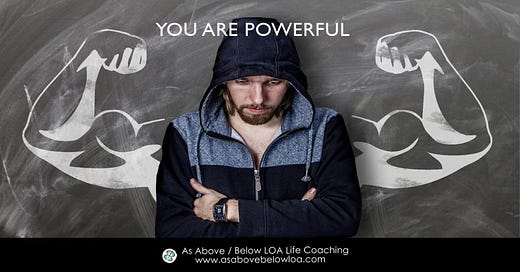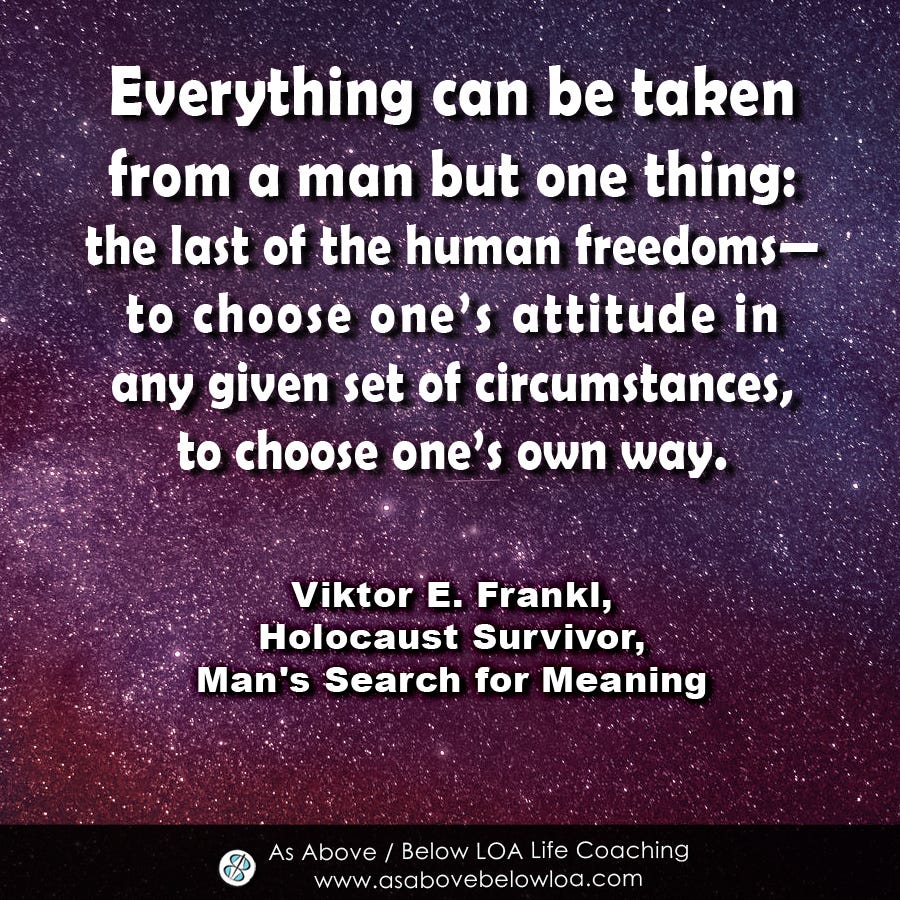This post was written on May 15, 2022, on my law of attraction life coaching blog. I’ll be uploading the old posts to start this new substack up.
You are so powerful. I know all about the various limiting beliefs that we tell ourselves. I’ve had interactions with people who keep wanting to tell me how powerless we all are. The most pushback I get is concerning racism, and the idea of mine that the Black Lives Matter movement has a victim mentality. Our society keeps telling us how difficult a problem like racism is to solve. If you are told your whole life that it’s difficult and that it’s systemic, then that is what you will believe even when/if it’s not true.
Of course, this self-defeating mindset is not limited to racism. In my post about COVID-19 shining a light on fear and powerlessness I explain how all sides can come from the exact same fears of powerlessness to vastly different conclusions, and yet, still agree with each other on the fact that they are powerless. Well, you’re not. You have power. But it’s not where you think it is.
Internal vs External Locus of Control
To explain this I want to share the difference between internal and external locus of control.
External Locus of Control
Someone with an external locus of control feels like things are happening to them. They feel like the control over where their life goes comes from some external source. They are stuck in the drama triangle, always blaming a scapegoat for why things are not going well for them. For example, a storm is an external force that could cause you to not be able to go for a walk. A storm would be considered an “act of God.” A boss requiring you to get a vaccine or be fired would be an external force that you cannot control. In that case, the boss would be the “persecutor” in the drama triangle. For the racism argument, some people say that systemic racism (external forces) keeps them from making more money. So they believe that racists are the “persecutor” in that case.
Internal Locus of Control
Someone with an internal locus of control exists outside of the drama triangle. A person with an internal locus of control believes that they have the power to change their life, more than other (external) forces do. Because they’re not enslaved to what other people do or don’t do, they are free.
For the storm example from above, this person would have checked the weather forecasts and planned ahead. They could have scheduled their walk for earlier in the week if they knew it would storm this day. For the vaccine example, they would either look to sue or look for another job (because they don’t want to work for someone who would require this of them). For the racism issue, this person might look into becoming an entrepreneur, making their own business where they could personally make sure that their business doesn’t rely on racists to become successful. Many do this and are wildly successful.
Feeling Powerful With An Internal Locus of Control
When you have an external locus of control you feel powerless against these external forces because you’ve become willfully enslaved to what they do. When you have an internal locus of control you feel powerful over the way your life goes because you’re free. To feel powerful, you simply need to look at the things that you do have control over in your life and do those things. When you focus on where your power lies, you no longer care what other people are doing or not doing.
Negative Thinking Hinders Your Brain Power
Shawn Achor wrote The Happiness Advantage, which I recommend reading. In it, he describes how happier people make better choices and, thus, make more money and can problem-solve better than pessimistic people. When you are afraid, worried, or anxious you are putting your body into the fight, flight, freeze, or fawn response which shuts down parts of your brain (until you can get into a relaxed state again). When you’re relaxed or excited, then your brain is able to think much more clearly and accept new possibilities. Albert Einstein has a great quote related to this: “I think 99 times and find nothing. I stop thinking, swim in the silence, and the truth comes to me.” When you’re in a state of worry, anger, or fear, then you are not in the same vibration as the solution.
“I think 99 times and find nothing. I stop thinking, swim in the silence, and the truth comes to me.”
ALBERT EINSTEIN
Opening Up To New Possibilities
But, sometimes it can be difficult to just “get happy” when you’re in a funk. So, Shawn Achor also wrote the book “Before Happiness.” Again, I highly recommend it. He cites studies and gives real-world examples of how it works. His whole book is explaining this, so I won’t get into many details here, but the basic idea is that to succeed in what we want to succeed in, we have to first believe that it is possible.
I find that interesting because it comes down to faith. But this faith isn’t related to religion. It can be. If you believe there is a God who has plans for you to accomplish something, then that belief can help you to achieve what you think those plans are. But for those who don’t believe in God, it just comes down to a faith that you can do what it is that you want to do. I made a video on how to increase your faith, which you can watch below.
List Past Successes
One of the best steps to increasing your faith is to look into your past and make a list of everything that you’ve accomplished so far that you didn’t think you could do at first. You can also choose to make smaller goals that you believe will help you to accomplish a larger goal. Then savor and celebrate those smaller wins. The listing (and appreciation) of small accomplishments helps you to have confidence that you can accomplish the larger goal.
Rational or Irrational Optimism?
Pessimism is a lack of faith (in yourself, others, or God). Optimism is a sign of faith. But being optimistic is an art. As Shawn Achor writes (in Before Happiness), “An irrational optimist has a vision of reality based on desire and delusion, not how things actually are. Irrational optimism is why financial bubbles form, why we buy homes we can’t afford, and why we prematurely put up banners that say ‘Mission accomplished.’ Irrational optimists see the world through rose-colored glasses without realizing that those tinted lens don’t enhance their vision, they distort it. And as a result, their decisions and actions are Pollyannaish and flawed. You can’t sugarcoat the present and still make good decisions for the future.”
I believe that there is a much more bright reality than the one we’re seeing currently (because we all have limiting beliefs). If you do catch a glimpse of that true reality, overly pessimistic people will say that you’ve got rose-colored glasses on. I tend to not judge people too harshly if they’re overly (in my opinion) optimistic about something, because I could be the one who has limiting beliefs.
Right now, we can’t believe in an absolutely awesome reality around us because of those limiting beliefs that act like spots on glasses. In the same way that he uses the rose-colored glasses analogy, I would say that these limiting beliefs of ours are acting like dirt on glasses, clouding our vision.
I understand that there are multiple ways to view our world, There’s the real reality, then there’s the pessimistic reality (dirty glasses), and then there’s the overly optimistic reality (rose-colored glasses). Personally, I believe that meditation and Ho’oponopono help me “clean my lenses,” so to speak. We will probably never agree with each other completely on what the real reality is because it is difficult to rid ourselves of all of our limiting beliefs.
I wanted to touch on all of those views of reality here so that you can keep them in mind. I’m not trying to be overly optimistic in my perception. I do realize that we can be. But I also want to remind you that you do have your own limiting beliefs that can keep you from seeing the real reality out there.
Doing the “Impossible” Can Be Possible
As I’ve said, the best way to get optimistic is to focus on what you’ve done in the past. Think about what you now believe that you can do, that you didn’t think you could before. It helps to give you faith that there are many other things that you can accomplish that you don’t believe right now that you can. It is possible for you to do many things that you think are impossible right now. You’ve already proven that to yourself in the past.
Taking Power Back With Focus
Your power is in your focus. Viktor Frankl, a holocaust survivor, wrote in his book “Man’s Search For Meaning” “Everything can be taken from a man but one thing: the last of human freedoms – to choose one’s attitude in any given set of circumstances, to choose one’s own way.”
You always have the power to choose what you think about and what you focus on and that is everything. Frankl describes in that book the importance of finding meaning. If someone hits you, you might immediately get angry because you thought they were trying to harm you. You believed the meaning of the act was harmful. But what if they were trying to slap a poisonous spider off your leg? What if the meaning was actually to be helpful? Your response to the exact same stimulus would be wildly different based on what meaning you ascribe to it. I’ve discussed how our beliefs shape what emotions come up in my article on how you cannot offend people (they offend themselves because of what meaning they give to the act).
In Before Happiness, Shawn Achor writes, “While the human brain receives eleven million pieces of information every second from our environment, it can process only forty bits per second, which means it has to choose what tiny percentage of this input to process and attend to, and what huge chunk to dismiss or ignore.* Thus your reality is a choice; what you choose to focus on shapes how you perceive and interpret your world.”
Instead of putting your focus on other people and what they’re doing or not doing, focus on what you can do right now. When you focus on the things that you can personally do, you feel powerful. Your brain will also help you to think of more ways in which you are powerful because “neurons that fire together wire together,” as Dr. Joe Dispenza always says.
Conclusion
So make a list of all the things that you have control (power) over. Remind yourself where your power lies. Appreciate all the things that you’ve done so far that you didn’t think you could do originally. And be mindful of when you start focusing with an external locus of control. Try to stay away from scapegoating the responsibility to change your life onto other people. Remember, taking personal responsibility is about choosing to embrace your power and choosing to no longer be a slave to what others do or don’t do.
* Manfred Zimmermann, “Neurophysiology of Sensory Systems,” in Fundamentals of Sensory Physiology, 3rd, rev. ed., ed. Robert F Schmidt (New York: Springer, 1986), 116.








